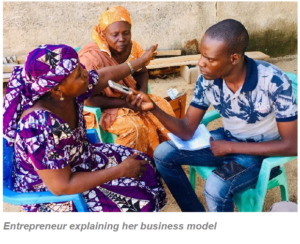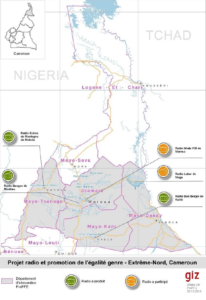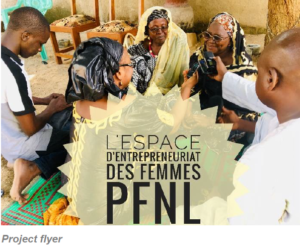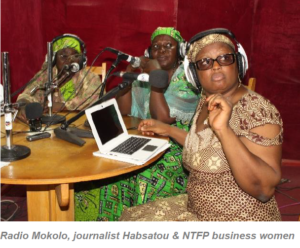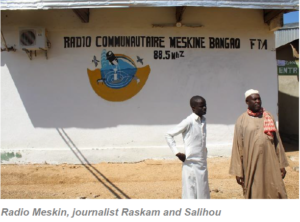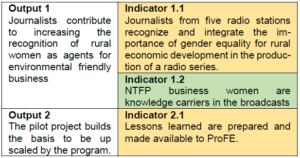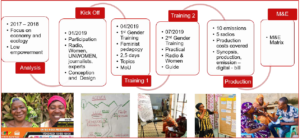Radios and women entrepreneurs in rural Cameroon call for gender equality
Five radio stations in the rural north of Cameroon
produce a series on micro-entrepreneurs of nontimber
forest products (NTFP). In fifty programmes,
the women talk about their business and the
challenge of asserting themselves in a society
dominated by men.
Tell your own story – according to this motto,
women entrepreneurs explain at prime time how they
run their NTFP business. Too often marginalised and
side-lined, a series of ten radio shows from five different
stations give these women an audible platform to
share their experiences with others.
“The stories of strong, rural women entrepreneurs
thus receive the attention they deserve,” says Désiré
Tchigankong, head of the project office in Maroua, the
regional capital of the Far North Region. It is the
women themselves who explain to their listeners how
they set up and run their business.
Most women in the region are potential entrepreneurs
as it is considered “female labour” to collect and process
non-timber forest products.
As a supplementary income, NTFP does usually not
earn them a living. Yet, the products have great potential,
some are even world-famous: Shea Butter,
Moringa and Neem have made it onto the shelves of
western drugstores. Unfortunately, not yet “Made in
Cameroon”.
Defying unfavourable conditions
The “business ladies”, as Tchigankong calls them,
work under adverse conditions: The climate up north
is arid, the soils are severely degraded, the security situation tense, society patriarchal and religious institutions
interpret sacred writings to the detriment of
women. Girls grow up in an environment that restricts
their economic and educational opportunities from
childhood on. A lack of economic prospects aggravates
the situation in a region where staggering threequarters
of the population live in absolute poverty.
Beside reforestation, forest management, and biodiversity
conservation GIZ’s Forest and Environment
Programme (ProPFE) supports 16000 micro-entrepreneurs
in five regions with technical and organisation
advices. Out of them, 2000 members of five
women networks developed to “elite women in the rural
Far North Region” a mayor said. At the same time,
a revised legal framework and material support for
mechanisation aim to improve women’s economic opportunities.
Empowerment – more than money
“We became strong women” says Ms Kaya proudly,
the president of the NTFP network in the Mayo Dany
department. But income alone does not lead to empowerment.
“Appreciation and equal power relations
mean that women decide for themselves about their
income,” explains Wibke Ott. As a gender expert for ProPFE, she works with the radios and women’s networks.
Ott stands in a dimly-lit room in front of a small
mixing desk with three microphones. Echo de Montagne
from the border town of Mokolo uses this space
as a studio. Wine-red fabric on the walls deaden the
sound of the rain outside.
Host Habsatou invited three female entrepreneurs to
today’s programme. Yesterday she returned from a
conference. Habsatou asks very direct questions for
30 minutes: “The purpose of the interview is to give
hands-on advice to her audience”.
Talking business
She asks Mana, a businesswoman from Maroua,
about the production costs of neem oil”. Mana illustrates
how she set up her business, how she plans
her costs and how she markets her products.
Aside from expert talks, it is also about men. One of
the success factors. “You can’t strengthen women’s
rights without including men,” emphasises Ott. She
speaks from experience, because apart from
Habsatou, the other journalists are male. A second
factor of success is the applied feminist pedagogy in
the 6,5 day gender trainings – from kick off to the closing
workshop. “Everyone has contributed to the knowledge and awareness of equality. A group dynamic
has emerged in which even taboo topics such
as non-heterosexual lifestyles have been addressed”.
Thirdly, the MoU, practical guide and the WhatsApp
group facilitated the successful implementation. Like
this, Journalists, entrepreneurs and GIZ where in constant
exchange support each other. The ten journalists
started production in June 2019.
Radios as change agents
From traditional gender roles, reducing gender based
discrimination and female entrepreneurship to environmental
protection – the radio programmes have a
wide variety of themes. “However, the most important
focus in terms of content is the Processor Business
School approach. The business ladies are experts on
that”, explains Haiwe, who has worked as a junior
consultant in Maroua since 2016.
In addition to economic problems, people in the region
have also been suffering from Boko Haram for
years. Barely 30 km from the Nigerian border, the inhabitants
of Mokolo were particularly often the target
of Islamists. According to the International Crisis
Group, the conflict has already claimed more than
2,000 lives and at least 7,000 women and girls have
experienced sexual violence from the terrorist group.
The other radio stations are less at risk, but similarly
remote: Bangao is in Meskine, Radio Labar in Maga
and Bon Berger broadcasts from Kaélé. Woila FM is
the only radio station in the regional capital Maroua.
At Radio Bangao, Raskam welcomes the film team
who prepares a short movie about the change agents
and strong women. Like his brother, he stresses the
importance of female entrepreneurs as role models.
In his programme, he focuses on marketing and the
costs incurred by women entrepreneurs.
From the idea to the result
It is not yet standard practice to consider gender
equality in a forest and environment programme – but
ProPFE became a trendsetter. The project encompasses
an exhaustive gender position, it covers gender
in the commission management reports to BMZ,
has an internal gender mainstreaming team and emphasises
equality, social inclusion, human rights and
the Do No Harm approach in its phase 2020 till 2020.
Yet, it took time.
Rural women haven been a primary actor for ProPFE.
But based on the reach-benefit and empowerment
approach, it is not enough to only reach women. The
radio pilot program contributes to the empowerment
of women in a male dominated sector and integrates
mainly male journalist as change agents for female
entrepreneurship and equality.
In January 2019, Ott and her colleague Haiwe developed
the radio concept which cost in total 15.000€. In
a participatory kick-off meeting, they brought together
radio journalists, women’s networks, women entrepreneurs,
UNWOMEN and other civil society actors
and gender experts.
The group quickly agreed that radios are the right medium
to give business women a strong voice. “Radio
is the most important source of information here in the
North,” emphasises Raskam.
UNESCO and UNWOMEN already had experience
working with radio stations at that time. Both organisations
supported the planning process and advised
ProPFE on the cooperation. “The formalisation of our cooperation in a MoU was a particular challenge for
us at the beginning,” Ott recalls.
To prepare the journalists for their work and promote
interest in social justice in rural areas, she developed
two gender trainings. “With methods from feminist
pedagogy, I wanted to focus on the experience of the
participants,” says Ott.
Haiwe and Ott have been satisfied with the results.
“The radios are incredibly motivated. In short term,
three radios produced 26 emissions. If we don’t count
Radio Maga and Woile, who had internal challenges,
then we realised 86% of the emission” reports Haiwe
enthusiastically. Within the pilot project 10 journalist
has been trained and five business women have been
knowledge carrier in each emission. “We are confident
that the radios will stay on and the program
scales up the radio approach in the long term. Recommendations
therefor are listed in the final report”
says Ott. Thanks to the work of the gender team in
ProPFE, the new programme phase starting in 2020,
has a stronger commitment to gender equality and
social inclusions” sums up Ute Nuber, head of decentralized
forest management. “We continue to focus on
the promotion of female elites in rural areas”, adds Dr
Kachelriess, the program director in exchange with
the minister of environment.
Listen to the emission: https://dms.giz.de/dms/llisapi.dll/app/nodes/288727933
Read the final report: https://dms.giz.de/dms/llisapi.dll/app/nodes/288728475

 GIZ Gender Website
GIZ Gender Website